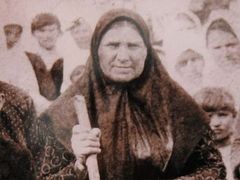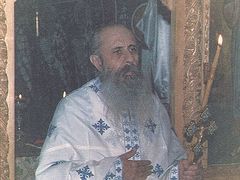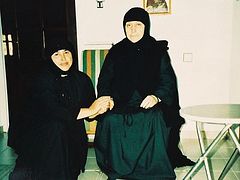Archimandrite Joel (Yannakopoulos) is one of the most famous and beloved Greek theologians of the twentieth century. Photios Yannakopoulos was born in 1901 in the village of Mathia (Draga), Messinia, and as a young man met the famous hermit Elijah (Panagoulakis), who uncovered a longing for the monastic life in the child’s heart. In 1925, already a hierodeacon, Fr. Joel graduated from the theology department of the Athens National University and was ordained as a priest in 1929. Along with serving, he worked as a middle school teacher. Fr. Joel later moved to Kalamata where he dedicated himself to theological research. The pinnacle of his painstaking work was his 26-volume Interpretation of the Old Testament, which was awarded the Athens Academy of Sciences prize. Fr. Joel, however, was no armchair theologian, but following the example of many holy fathers of the Church, combined within himself an academic scholar and judicious elder, to which numerous stories from his life bear witness.
Who should reconcile first
One day a peasant brought Fr. Joel some “weighty” reasons why he couldn’t reconcile with his brother: “Father, I can’t speak first. My brother should speak first—he’s guilty, not me! Besides, he’s younger, and I’m older!”
Fr. Joel asked him, “Tell me—who is older: us or God?”
“What kind of question is that? God, of course!”
“And who was guilty before whom? God before us, or we before God?”
“We were guilty before God!”
“And who made a step towards reconciliation? Did we move towards God or did God come to us?”
“God came to us!”
“And that means?”
“It means… Thank you, Father, you are correct! I will go to my brother first!”
The Lord’s Prayer from the inside
Fr. Joel advised one man who found it difficult to forgive: “Learn the Lord’s Prayer well.”
“I’ve known the Lord’s Prayer by heart since childhood.”
“You know it by heart, but not from the inside!”
“What do you mean?”
“You don’t know the meaning of this prayer. You recite it mechanically. If you knew it from the inside, you would willingly forgive your neighbor, because otherwise it’s impossible for God to forgive you your trespasses! This is what the words, ‘And forgive us our debts as we forgive our debtors’ mean. So, you should learn the Lord’s Prayer from the inside.
On whether it’s a sin to want to die
One poor and sick old woman asked Fr. Joel, “Father, is it a sin that I want to die?”
“If you want to die,” Fr. Joel replied, “to deliver yourself from the difficulties of life, then it is a sin, because you thereby grumble against God for allowing such difficulties. However, if you want to die so as to sin no longer and not to grieve God, then it is no sin. And, if you desire death because you cannot stand separation from God and you want to be with Him as soon as possible, then your desire to die is blessed!”
On the desire for monasticism
One father asked Elder Joel, “Father Joel, why do you encourage girls to become nuns?”
“I don’t encourage them, but I don’t interfere. I neither ignite nor extinguish the desire for monasticism. I don’t ignite it because it’s not within my power: Only the Holy Spirit can do so. But I don’t extinguish it because I should not do so. Who am I to extinguish a flame that God lights?”
“But if you’re not encouraging them to become nuns, then how do you explain that so many girls who confess to you want to become nuns?”
“Your question would be correctly reformulated this way: ‘Why do so many girls who want to become nuns come to you for confession?’ Then I would answer you, ‘Because everyone knows that I don’t discourage people from monasticism.’ Thus, they come to me because they are sure that I won’t oppose their desire. Do you understand now?”
Faith and miracles
Once, when Fr. Joel was traveling on a train, a rumor spread at one provincial station that a miracle had occurred in the church in the neighboring village—an icon was weeping! All of the passengers immediately left the train and rushed to see the miracle—everyone, that is, except Fr. Joel, who continued reading his book.
When the passengers returned, touched, the man sitting right across from Fr. Joel couldn’t hold back his indignation at the priest’s calmness and said, “Father, I see you don’t believe!”
“I believe,” Fr. Joel replied, “and therefore I’m not surprised by miracles. But you don’t believe, and so you ran to see the miracle and believe, didn’t you? So tell me—do you believe now?”
The difference between Christianity and communism
A communist once told Fr. Joel, “Father, communism is the same as Christianity! In terms of society, there’s no difference between them. Both communism and Christianity want equality, brotherhood, and social justice.”
“However, there is one small difference,” said Fr. Joel.
“What?”
“Christianity tells its followers: ‘Why do you have, and another does not? Go and give to him!’ But communism tells its followers: ‘Why does another have, and you do not? Go and take from him!’ Do you see the difference?”
Christianity’s passing grade
A middle school teacher once told Fr. Joel, “Father, in my opinion, it’s completely wrong to do good with the goal of enjoying Paradise or delivering yourself from hell. We should do good only for the sake of love for God.”
Fr. Joel asked the teacher, “When you grade your students, do you give only 0s and 100s? There’re no other grades?”
“Of course there are! I use the whole scale from 0 to 100. Students with a 65 or above pass, the rest do not.”
“And Christianity has its own grading scale. Those who do good exclusively because they desire to fulfill the will of God receive an ‘A.’ Christianity gives a somewhat lower grade to those who do good in order to enjoy Paradise, and those who do good to avoid hell receive a yet lower score. But all three of these grades are higher than a 65, and so all of these people ‘pass.’ If you want, labor spiritually to get an ‘A.’ No one is hindering you. But look sympathetically upon those poor people who are fighting for a ’65.’”
From the book Charisma and Charismatics: An Anthology of the Manifestations of the Gifts of Grace, vol. 3, The Holy Monastery of the Paraclete, Oropos, 2009






The title of the article mentions the word 'wise' -- and Fr. Joel Yannakopoulos is wisdom exemplified.